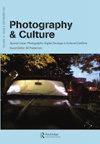Us in Relation to the Universe—Collaborative North-South Photographic Practice Research
IF 0.3
4区 艺术学
0 ART
引用次数: 0
Abstract
Abstract In 1986 Kenyan writer Ngũgĩ wa Thiong’o argued that ‘[t]he choice of language and the use to which language is put is central to a people’s definition of themselves’ (Ngũgĩ 1986:4). This article re-applies Ngũgĩ’s analysis to contemporary African photographic practice, since images are similarly central to people’s self-definition. Collaborating with the Zambian National Visual Arts Council, the practice-research project Stories of Kalingalinga developed a photographic workshop (2019) and exhibition (2020) to counteract Zambia’s lack of institutional engagement with photography. Focused on Kalingalinga, a high-density neighbourhood undergoing gentrification in Zambia’s capital Lusaka, the workshop provided space to experiment in decolonising creative practice through slow action research. As a photographer, animateur and curator from the global north, I present work by Zambian project participants Scotty Jongolo, Danny Chiyesu, Zenzele Chulu, Edith Chiliboy, Natalia Gonzalez Acosta, Margaret Malawo Mumba, Dennis Mubanga Kabwe, David Daut Makala, Muchemwa Sichone and Yande Yombwe. The article discusses the decolonisation of Zambian photography and the workshop’s deepening of my own decolonial photographic practice. I highlight the importance of empowering Zambian photographers through encouraging critically informed image-making in contemporary African photographic practice. African visual self-governance requires building supportive communities that embrace alternative and creative ways of knowledge creation.我们与宇宙的关系——南北合作摄影实践研究
摘要1986年,肯尼亚作家Ngũgĩwa Thiong'o认为,“语言的选择和语言的使用是一个民族对自己定义的核心”(NgŪg \297; 1986:4)。本文将吴的分析重新应用于当代非洲摄影实践,因为图像同样是人们自我定义的核心。实践研究项目“卡林加林加的故事”与赞比亚国家视觉艺术委员会合作,举办了一个摄影研讨会(2019年)和展览(2020年),以应对赞比亚缺乏机构参与摄影的问题。研讨会的重点是卡林加林加,这是赞比亚首都卢萨卡一个正在进行绅士化的高密度社区,通过慢行动研究,为创造性实践的非殖民化实验提供了空间。作为一名来自全球北方的摄影师、动画制作人和策展人,我展示了赞比亚项目参与者Scotty Jongolo、Danny Chiyesu、Zenzele Chulu、Edith Chiliboy、Natalia Gonzalez Acosta、Margaret Malawo Mumba、Dennis Mubanga Kabwe、David Daut Makala、Muchemwa Sihone和Yande Yombwe的作品。文章讨论了赞比亚摄影的非殖民化,以及研讨会对我自己非殖民化摄影实践的深化。我强调了通过鼓励在当代非洲摄影实践中进行批判性知情的图像制作来增强赞比亚摄影师能力的重要性。非洲视觉自治需要建立支持性社区,接受替代和创造性的知识创造方式。
本文章由计算机程序翻译,如有差异,请以英文原文为准。
求助全文
约1分钟内获得全文
求助全文

 求助内容:
求助内容: 应助结果提醒方式:
应助结果提醒方式:


